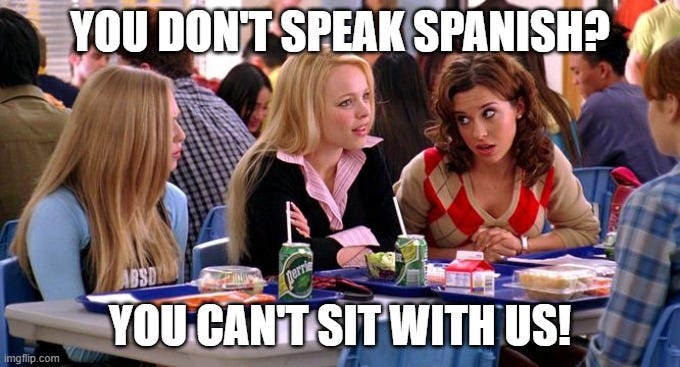Where Are You From? ¿De dónde eres?
Deciphering THAT question while exploring language, identity, and belonging
This is the last of the Hispanic Heritage Month essays. I hope you’ve enjoyed them and learned something useful. This is also the last regular Substack post for a while as we make The Big MoveTM. The next episode of the podcast will come out on October 31 and posts will resume then. In the meantime, you’ll still receive ¡El Playlist! on Fridays if you’re subscribed.
Where are you from?
I never knew what that question actually meant. I’ve been hearing it since I was a little girl. I had no idea that my lightly tanned skin and curly hair confused people as to whether or not I belonged. In Los Angeles, with its massive population of Latines, I always understood it as a way of sussing out whether or not I too came from their country of origin.
Because mostly the people who ask me this (even today) are also brown. First or second-generation immigrants who might still have accents and bear the weight (or scars) of immigrating to this new and sometimes unkind land. They see a similarly pigmented face and ask, in their roundabout way, “are you one of us?”
¿De dónde eres?
The answer is simple, because it usually comes in Spanish: mi mamá es de México, y mi papá es de Puerto Rico (translation: my mom is from Mexico, dad is from Puerto Rico). The implication being that I was born here.
I’ve always thought it was a question of inclusion, as opposed to exclusion. Bringing us together, saying “yes, I am one of us.” A way of finding community.
Obviously it isn’t only brown people who ask. Back in college, when everyone was from somewhere else, the question wasn’t as loaded. Those were the salad days of adulthood…
There have been plenty of times when I was confused for Persian, Armenian, Arab, or even mixed Black and white. I really wish I spoke Farsi or Arabic, if only to fit in with the people who asked, to be a part of their communities.
And yes, of course there have been people who pose the question who do not have inclusion in mind.
So as I’m actively in the process of moving (or is it returning?) to Puerto Rico, one of the things I’ve wondered is how will I fit in?
They’ll know I’m not a “true” Puerto Rican the moment I open my mouth. The American-accented Spanish will be impossible to hide (at least at first). They’ll ask the same of my similarly complected chameleon of a white husband next to me, whose Spanish is improving but not fluent yet either, and our disguises will fall apart. Our true selves will be revealed and likely misinterpreted as colonizing interlopers who can’t even speak Spanish.
It’s one thing to experience this on vacation. It’s quite another to live in it. I’d be lying if I wasn’t at least a little uneasy about it.
Where are you from?
When a Puerto Rican asks me this, what will they be implying? What will my answer be?
Can I stick with mi mamá es de México, y mi papá es de Puerto Rico, with the implication that I was born…where?
“Here” will mean something very different. Do I just say California? Los Angeles? Qualify it with “but my dad is from Coamo” to avoid the disdain for gringo Americans?
I know I’m not a colonizing American. I know I’m my father’s daughter. But where am I really from? If I’m back on my father’s native land, where my blood called home for over 100 years before detouring for new opportunities elsewhere, am I not returning to a home I never knew?
Where am I from?
There’s so many ways to answer that, and the answer will continue to change.
I’m from where I was planted, where the roots grew. Now is the time to examine the roots. I’m repotting, so to speak. Transplanting my life into a bigger pot so I have more room to grow.
This is why we chose Puerto Rico in the first place. It’s where we can improve our language skills, deepen the roots of my culture, and live a slower pace of life. Live a more carefree life, a vida más chévere. So I can continue to approach dismantling the toxic cultural norms we all grew up with from a new angle.
I don’t expect it to be easy. Pushing out of your comfort zone never is. I know it might be difficult, but discomfort is part of growth. I lift weights and fight gravity all the time. What else have I been training for if not to confront challenges?
For more about challenges, check out these three episodes on this very topic:
Diet, Cheer Squads, & Power Tools: Life Lessons from Weightlifting, Part 2
Progress, Gains, & Your Comfort Zone: Life Lessons from Weightlifting, Part 3
So, dear reader, how do you answer the question of where you’re from? Do you claim your birth city, your parents’ ethnicity, the place you currently live?
Let me know in the comments 🔽🔽🔽





